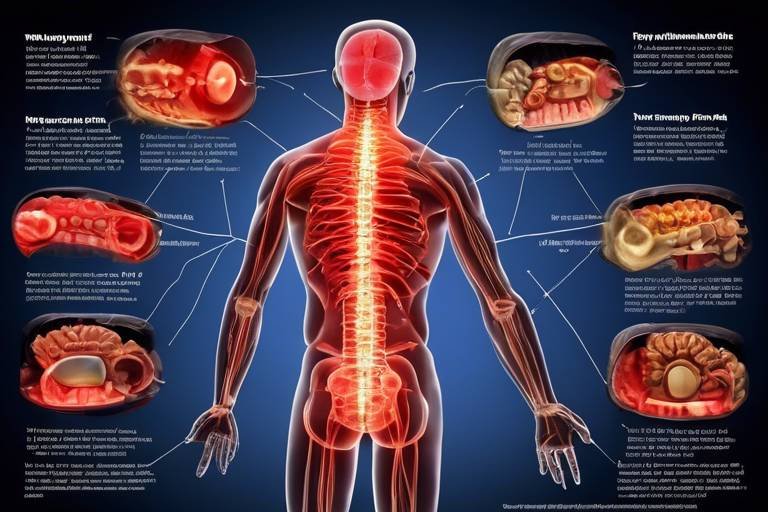The Role of Fats in Our Diet - The Science Behind It
Have you ever wondered why fats have gotten such a bad rap over the years? It’s time to set the record straight! Fats are not the enemy; in fact, they are essential players in our diet. This article dives deep into the essential role of fats in our diet, exploring their types, health benefits, and how they contribute to our overall well-being. Think of fats as the unsung heroes of nutrition, quietly working behind the scenes to keep our bodies functioning optimally.
Dietary fats are crucial macronutrients that provide energy and support cell growth. They are not just empty calories; they serve multiple vital functions in the body. Fats help in the absorption of fat-soluble vitamins (A, D, E, and K), provide insulation and protection for our organs, and are a major source of energy, especially during prolonged physical activity. Without adequate fat intake, our bodies would struggle to perform at their best.
When it comes to dietary fats, not all are created equal. There are several types of fats, and understanding these can help us make healthier choices. The main categories include:
- Saturated Fats
- Unsaturated Fats
- Trans Fats
Each type has unique properties and health implications, which we will explore in detail.
Saturated fats are often found in animal products and certain oils. They have been a topic of much debate in the health community. While some experts warn against high consumption of saturated fats due to their potential link to heart disease, others argue that the relationship is more complex than previously thought. It’s crucial to look at the whole diet rather than focusing solely on one nutrient.
Common sources of saturated fats include:
- Red meat
- Butter
- Cheese
These foods can be enjoyed in moderation, but it's important to be mindful of portion sizes and overall dietary patterns.
The impact of saturated fats on heart health is contentious. Research findings are mixed, with some studies suggesting that saturated fats may not be as harmful as once thought. However, dietary guidelines still recommend limiting saturated fat intake to less than 10% of total daily calories. It’s essential to stay informed and consult with healthcare professionals about your individual dietary needs.
Unsaturated fats are considered healthier options and are found in plant-based oils, nuts, and fish. These fats can be divided into two categories: monounsaturated and polyunsaturated fats. They are known to improve heart health, reduce inflammation, and support overall wellness. Incorporating unsaturated fats into your diet can be a delicious way to enhance your meals while benefiting your health.
Trans fats are artificial fats linked to various health issues, including heart disease. They are created through a process called hydrogenation, which solidifies liquid oils. It's important to avoid trans fats as much as possible, as they can raise bad cholesterol levels (LDL) and lower good cholesterol levels (HDL). Always check food labels to steer clear of these unhealthy fats.
Fats are not just sources of energy; they also play vital roles in nutrient absorption and hormone production. Healthy fats can help you feel full and satisfied, making it easier to maintain a balanced diet. They are crucial for brain health, as our brains are made up of nearly 60% fat! Consuming healthy fats can also support skin health and reduce the risk of chronic diseases.
Incorporating healthy fats into your diet can be simple and delicious. Here are some practical tips:
- Use olive oil or avocado oil for cooking instead of butter.
- Add nuts and seeds to your salads or smoothies.
- Enjoy fatty fish like salmon or mackerel a couple of times a week.
These small changes can make a big difference in your overall health and well-being.
Understanding the role of fats in your diet is essential for making informed food choices. While fats have often been vilified, they are a necessary part of a balanced diet. The key is to focus on moderation and balance. By incorporating healthy fats and being mindful of your overall dietary intake, you can enjoy the benefits that these macronutrients provide for optimal health.
Q: Are all fats bad for you?
A: No, not all fats are bad. Healthy fats, such as unsaturated fats, are beneficial for your health.
Q: How much fat should I include in my diet?
A: It's generally recommended that 20-35% of your total daily calories come from fats, focusing on healthy sources.
Q: Can I eat saturated fats?
A: Yes, but it’s best to limit saturated fats to less than 10% of your total daily calories and choose healthier options when possible.

Understanding Dietary Fats
When we talk about dietary fats, it’s easy to get lost in the confusion of good versus bad. But the truth is, fats are essential macronutrients that our bodies need to function properly. They provide energy, support cell growth, and help our bodies absorb vital nutrients. Imagine your body as a car; without the right fuel, it simply won't run efficiently. Just like a car needs oil to keep its engine running smoothly, our bodies require fats for optimal performance.
Fats are not just a source of energy; they also play a crucial role in various bodily functions. For instance, they are vital for the production of hormones and are essential for maintaining healthy skin and hair. They also help in the absorption of fat-soluble vitamins such as A, D, E, and K. Without these fats, our bodies would struggle to utilize these important nutrients, leading to deficiencies that can affect our overall health.
It’s important to understand that not all fats are created equal. There are different types of dietary fats, each with its own unique properties and effects on our health. While some fats can be beneficial, others can pose serious health risks if consumed in excess. To simplify things, we can categorize dietary fats into three main types:
- Saturated Fats: Typically found in animal products and some plant oils.
- Unsaturated Fats: Generally considered the healthier option, found in plant-based oils, nuts, and fish.
- Trans Fats: Artificial fats that are linked to numerous health problems.
Understanding these categories is crucial for making informed dietary choices. For example, while saturated fats have been scrutinized for their potential impact on heart health, unsaturated fats are celebrated for their heart-protective properties. This distinction can guide us in choosing the right types of fats to include in our diets.
Moreover, the balance of fats we consume can significantly influence our health. It’s not just about the types of fats, but also the quantity. Moderation is key; consuming too much of any type of fat can lead to weight gain and other health issues. So, how do we ensure we’re getting the right fats in the right amounts? That’s where understanding dietary fats becomes essential. By learning how to read nutrition labels and recognizing the sources of different fats, we can make smarter choices that benefit our health.
In conclusion, dietary fats are a fundamental part of our nutrition, and understanding their role can empower us to make better food choices. By embracing healthy fats while being mindful of our overall intake, we can fuel our bodies effectively and enjoy a balanced diet that supports our well-being.

Types of Dietary Fats
When it comes to dietary fats, understanding their types is crucial for making informed choices about what we eat. Fats are not all created equal; they come in various forms, each with its own unique properties and effects on our health. Broadly speaking, dietary fats can be categorized into three main types: saturated fats, unsaturated fats, and trans fats. Each type plays a different role in our body and has distinct implications for our health.
Saturated fats are typically solid at room temperature and are primarily found in animal products such as meat and dairy, as well as in some plant oils like coconut oil and palm oil. These fats have long been scrutinized due to their potential link to heart disease. However, recent studies suggest that the relationship between saturated fat and heart health is more complex than previously thought. This ongoing debate highlights the need for a nuanced understanding of how these fats fit into our overall diet.
On the other hand, we have unsaturated fats, which are generally liquid at room temperature and are considered healthier options. They can be further divided into two categories: monounsaturated fats and polyunsaturated fats. Monounsaturated fats, found in foods like olive oil, avocados, and nuts, are known for their heart-healthy benefits. Polyunsaturated fats, which include omega-3 and omega-6 fatty acids, are essential fats that our body cannot produce on its own. These fats are found in fatty fish, flaxseeds, and walnuts, and they play a vital role in brain function and cell growth.
Lastly, we have trans fats, which are often referred to as the "bad fats." These artificial fats are created through a process called hydrogenation, which makes liquid oils solid. Trans fats are commonly found in processed foods, such as baked goods, snacks, and fried foods. Research has shown that trans fats can raise bad cholesterol levels (LDL) while lowering good cholesterol levels (HDL), significantly increasing the risk of heart disease. As a result, many health organizations recommend minimizing or completely avoiding trans fat consumption.
To summarize, here’s a quick overview of the different types of dietary fats:
| Type of Fat | Sources | Health Implications |
|---|---|---|
| Saturated Fats | Red meat, butter, cheese, coconut oil | Controversial; may raise cholesterol levels |
| Unsaturated Fats | Olive oil, nuts, fatty fish | Heart-healthy; beneficial for cholesterol levels |
| Trans Fats | Processed foods, baked goods, margarine | Increase risk of heart disease; should be avoided |
Understanding these different types of fats is essential for making better dietary choices. By focusing on incorporating more unsaturated fats into our meals while being mindful of saturated and trans fats, we can significantly improve our overall health and well-being.

Saturated Fats
Saturated fats often get a bad rap, but let’s dive into why this macronutrient deserves a second look. These fats are primarily found in animal products and some plant oils, and they are solid at room temperature. Think of butter or the fat on a steak; that’s saturated fat in action! But what does this really mean for your health? The conversation around saturated fats is as heated as a summer barbecue, with opinions swinging from one extreme to another.
First off, it’s essential to understand where saturated fats come from. Common sources include:
- Red meat (like beef and lamb)
- Full-fat dairy products (such as cheese, butter, and cream)
- Certain oils (like coconut oil and palm oil)
Now, let’s talk about the ongoing debate surrounding saturated fats. Some experts argue that saturated fats raise levels of LDL cholesterol, often referred to as "bad" cholesterol, which can lead to heart disease. However, other research suggests that the relationship between saturated fat and heart health is not so straightforward. For instance, a study published in the American Journal of Clinical Nutrition found that saturated fat intake did not significantly increase the risk of coronary heart disease. This contradictory evidence leaves many wondering: should we be cutting out saturated fats entirely, or is moderation the key?
It’s crucial to consider the broader context of your diet. If your saturated fat intake comes from whole, nutrient-dense foods, it might not be as harmful as previously thought. For example, a diet rich in fruits, vegetables, whole grains, and lean proteins can offset some of the potential risks associated with saturated fats. Think of your diet as a balancing act, where the quality of the food you consume plays a significant role in your overall health.
To help you navigate this complex topic, here’s a quick overview of the health implications of saturated fats:
| Health Aspect | Potential Impact |
|---|---|
| Cholesterol Levels | May increase LDL cholesterol |
| Heart Disease Risk | Controversial; some studies show no significant link |
| Weight Management | Can contribute to calorie intake; moderation is key |
In conclusion, saturated fats are not the enemy they’re often made out to be. While it’s wise to be mindful of your intake, especially from processed foods, enjoying saturated fats in moderation—especially from natural sources—can fit into a healthy lifestyle. The bottom line? Balance is crucial! So, the next time you’re tempted to skip that slice of cheese or indulge in a creamy dessert, remember that it’s all about moderation and the overall quality of your diet.

Sources of Saturated Fats
Saturated fats are commonly found in a variety of foods, and understanding where these fats come from is essential for making informed dietary choices. They are primarily derived from animal sources, but some plant-based oils also contain saturated fats. When you think of saturated fats, the first items that often come to mind are red meat, butter, and cheese. These foods are not just staples in many diets; they also contribute significantly to the saturated fat content of our meals.
Red meat, such as beef, lamb, and pork, is notorious for its high saturated fat content. A typical serving of steak can contain anywhere from 5 to 10 grams of saturated fat, depending on the cut. Similarly, processed meats like sausages and bacon are also rich in saturated fats, making them a double-edged sword for those who enjoy them. While they can be tasty, moderation is key.
Butter, often used in cooking and baking, is another major source of saturated fat. Just one tablespoon of butter can pack around 7 grams of saturated fat. It's important to consider alternatives, such as olive oil or avocado oil, which provide healthier fat options without the saturated fat load.
Cheese is another delicious yet saturated fat-laden food. Varieties like cheddar, gouda, and cream cheese can contain significant amounts of saturated fat. For instance, a single ounce of cheddar cheese can have approximately 6 grams of saturated fat. While cheese can be a great source of calcium and protein, it's wise to enjoy it in moderation, especially if you're monitoring your saturated fat intake.
In addition to these animal products, some plant-based oils, like coconut oil and palm oil, also contain saturated fats. For example, coconut oil is often hailed for its health benefits, but it contains about 12 grams of saturated fat per tablespoon. This makes it crucial to be aware of how much you’re using, especially if you’re trying to limit your saturated fat consumption.
In summary, while saturated fats can be a part of a balanced diet, being aware of their sources is vital. Incorporating a variety of foods and making conscious choices can help you enjoy your meals while managing your health effectively. Remember, the key is not necessarily to eliminate saturated fats but to consume them in moderation and balance them with healthier fat options.
- What are the main sources of saturated fats?
Common sources include red meat, butter, cheese, and certain oils like coconut and palm oil. - Are all saturated fats bad for you?
Not necessarily. While it's important to limit saturated fat intake, some sources can be part of a balanced diet when consumed in moderation. - How can I reduce my saturated fat intake?
Consider choosing lean cuts of meat, using plant-based oils, and enjoying dairy products in moderation.

Health Implications of Saturated Fats
Saturated fats have long been a topic of heated debate in the nutrition world. While they are often labeled as the "bad guys" of dietary fats, the reality is much more nuanced. It's essential to understand that not all saturated fats are created equal, and their impact on health can vary widely depending on the source and the overall dietary context. Research has shown that high intake of saturated fats may lead to increased levels of LDL cholesterol, commonly known as "bad" cholesterol, which is associated with a higher risk of heart disease. However, recent studies suggest that the story isn't so black and white.
For instance, saturated fats from whole, minimally processed foods like dark chocolate and coconut oil might not have the same negative effects as those from processed foods. This highlights the importance of considering the food source rather than just the fat type. A balanced approach to fat consumption can make a significant difference. The American Heart Association recommends limiting saturated fat intake to less than 6% of total daily calories, but many health professionals argue that moderation is key. They suggest focusing on the overall quality of the diet and emphasizing whole foods over processed options.
Moreover, it's crucial to consider how saturated fats fit into your overall diet. If you're consuming a diet rich in fruits, vegetables, whole grains, and healthy fats, a moderate amount of saturated fat may not be detrimental. The key takeaway is to prioritize quality over quantity. Instead of eliminating saturated fats entirely, aim for a balanced diet that includes a variety of fats. Here’s a quick overview of how different sources of saturated fats stack up:
| Food Source | Saturated Fat Content (per 100g) | Health Considerations |
|---|---|---|
| Butter | 51g | High in saturated fat; use sparingly |
| Cheese | 25g | Provides calcium; moderation is key |
| Coconut Oil | 82g | Contains medium-chain triglycerides; may have health benefits |
| Dark Chocolate | 43g | Rich in antioxidants; choose high cocoa content |
In summary, while saturated fats do have potential health implications, they can be part of a healthy diet when consumed in moderation and sourced from whole foods. The focus should be on a well-rounded diet that includes unsaturated fats, which are generally considered more beneficial. As always, it's best to consult with a healthcare provider or a registered dietitian for personalized advice tailored to your health needs.
- Are all saturated fats bad for you? Not necessarily. The health impact of saturated fats depends on the source and overall dietary context.
- How much saturated fat should I consume? It is generally recommended to limit saturated fat intake to less than 6% of total daily calories.
- Can I include saturated fats in a healthy diet? Yes, including moderate amounts of saturated fats from whole foods can be part of a balanced diet.

Unsaturated Fats
When it comes to fats, not all are created equal, and are the shining stars of the dietary fat world. These fats are primarily found in plant-based oils, nuts, seeds, and fish, and they come in two main forms: monounsaturated and polyunsaturated fats. But why should you care about these fats? Well, they offer a plethora of health benefits that can significantly enhance your overall well-being.
Monounsaturated fats, which are abundant in foods like olive oil, avocados, and certain nuts, are known for their ability to lower bad cholesterol levels. Imagine your arteries as highways; monounsaturated fats help keep them clear and flowing smoothly, reducing the risk of heart disease. On the other hand, polyunsaturated fats, found in fatty fish like salmon, walnuts, and flaxseeds, include essential fatty acids like omega-3 and omega-6. These are crucial for brain health and cell function, acting like the oil that keeps the engine running smoothly.
Now, let’s break it down further. Here are some key benefits of incorporating unsaturated fats into your diet:
- Heart Health: Unsaturated fats can help lower cholesterol levels, reducing the risk of heart disease.
- Inflammation Reduction: Omega-3 fatty acids, a type of polyunsaturated fat, are known for their anti-inflammatory properties.
- Brain Function: Healthy fats are vital for cognitive function and can even support mental health.
But how do you know if you're getting enough unsaturated fats? It’s easier than you might think! Consider adding a drizzle of olive oil to your salads, snacking on a handful of nuts, or enjoying fatty fish a couple of times a week. Not only will these foods provide you with essential nutrients, but they also add flavor and satisfaction to your meals.
In conclusion, unsaturated fats are not just a healthier alternative to saturated fats; they are essential components of a balanced diet. By making simple swaps and being mindful of your fat intake, you can harness the power of these beneficial fats to improve your health and enjoy delicious meals at the same time.
1. What are the best sources of unsaturated fats?
The best sources include olive oil, avocados, nuts, seeds, and fatty fish like salmon and mackerel.
2. How much unsaturated fat should I include in my diet?
Aim for a balance, where unsaturated fats make up the majority of your fat intake, ideally 15-30% of your total daily calories.
3. Are all fats bad for you?
No, while trans fats and excessive saturated fats can be harmful, unsaturated fats are beneficial and essential for health.
4. Can I cook with unsaturated fats?
Yes, you can use oils like olive oil for cooking, but be mindful of the smoke point to preserve their health benefits.

Trans Fats: The Bad Fats
When it comes to dietary fats, trans fats are the ones that raise the most eyebrows. These are the bad fats you often hear about, and for good reason! Trans fats are primarily created through an industrial process that adds hydrogen to liquid vegetable oils, making them more solid at room temperature. This process not only extends the shelf life of food products but also alters the natural structure of fats, leading to a host of health concerns.
So, why should we be wary of trans fats? The most significant issue is their impact on heart health. Trans fats have been shown to raise bad cholesterol (LDL) levels while simultaneously lowering good cholesterol (HDL) levels. This double whammy can significantly increase the risk of heart disease, stroke, and type 2 diabetes. In fact, studies have indicated that just 2% of your daily caloric intake from trans fats can increase your risk of heart disease by 23%!
Trans fats are commonly found in a variety of processed foods, which can make them tricky to avoid. Here are some typical sources:
- Fried foods, such as doughnuts and french fries
- Baked goods, including pastries, cookies, and cakes
- Margarine and shortening
- Snack foods, like microwave popcorn and crackers
Due to their harmful effects, many countries have implemented regulations to limit or ban the use of trans fats in food products. For instance, in the United States, the FDA has deemed partially hydrogenated oils, the primary source of trans fats, as not "generally recognized as safe." This has led to a significant reduction in their use, but it's still essential to check food labels for partially hydrogenated oils to steer clear of these unhealthy fats.
In summary, while some fats are necessary for our health, trans fats are a different story. They pose serious health risks and should be avoided whenever possible. By being vigilant about food labels and making informed choices, you can protect your heart and overall well-being from the dangers of trans fats.
1. What are trans fats?
Trans fats are artificially created fats that are formed through the hydrogenation of vegetable oils. They are commonly used in processed foods to improve texture and extend shelf life.
2. Why are trans fats considered unhealthy?
Trans fats raise bad cholesterol levels while lowering good cholesterol levels, increasing the risk of heart disease, stroke, and type 2 diabetes.
3. How can I avoid trans fats?
To avoid trans fats, read food labels carefully and look for products that do not contain partially hydrogenated oils. Opt for whole, unprocessed foods whenever possible.
4. Are there any safe levels of trans fats?
No, health organizations recommend that trans fats should be kept as low as possible in your diet, ideally to zero.

The Health Benefits of Fats
When you think of fats, what comes to mind? Maybe you picture greasy burgers or rich desserts, but the truth is, fats are essential for our bodies. They are not just a source of energy; they play a crucial role in numerous bodily functions that keep us healthy and thriving. Imagine your body as a high-performance engine. Just like a car needs the right fuel to run smoothly, your body needs healthy fats to operate at its best.
One of the primary benefits of fats is their role in nutrient absorption. Certain vitamins, specifically A, D, E, and K, are fat-soluble, meaning they require dietary fat to be absorbed effectively. Without adequate fat intake, you might miss out on these vital nutrients, which can lead to deficiencies. Think of these vitamins as the superheroes of your health—they need their sidekick, fat, to unleash their full potential!
Moreover, fats are integral to hormone production. Hormones are the body's messengers, orchestrating everything from metabolism to mood. Healthy fats, particularly omega-3 and omega-6 fatty acids, are essential for the production of hormones like insulin and estrogen. Without enough healthy fats, your hormonal balance can be thrown off, leading to a cascade of health issues. It's like trying to tune a guitar without the right strings; everything just sounds off!
Additionally, fats contribute to brain health. The brain is composed of nearly 60% fat, and certain types of fats, such as omega-3 fatty acids, are crucial for maintaining cognitive function and mental health. Studies have shown that diets rich in omega-3s can help reduce the risk of depression and cognitive decline. So, if you want to keep your mind sharp and your mood elevated, incorporating healthy fats like those found in fish, walnuts, and flaxseeds is a smart move.
Another significant benefit of healthy fats is their ability to promote heart health. While saturated fats have received a bad rap, unsaturated fats, particularly monounsaturated and polyunsaturated fats, can help lower bad cholesterol levels and reduce the risk of heart disease. Foods like avocados, olive oil, and fatty fish are not only delicious but also heart-friendly. It's like having your cake and eating it too—without the guilt!
To illustrate the various benefits of fats, take a look at the table below, which summarizes some key health benefits associated with different types of dietary fats:
| Type of Fat | Health Benefits |
|---|---|
| Monounsaturated Fats | Lower bad cholesterol, reduce heart disease risk, and improve insulin sensitivity. |
| Polyunsaturated Fats | Support brain health, reduce inflammation, and promote heart health. |
| Saturated Fats | Needed for hormone production, but should be consumed in moderation. |
| Trans Fats | Should be avoided as they increase heart disease risk. |
Incorporating healthy fats into your diet can also help you feel full and satisfied. When you eat fats, they slow down digestion, which means you stay full longer. This can be particularly helpful for those looking to manage their weight. Instead of reaching for that sugary snack, consider a handful of nuts or a slice of avocado. Not only will you feel more satisfied, but your body will thank you for the nutritional boost!
In conclusion, fats are far from the enemy they are often portrayed to be. They are essential for nutrient absorption, hormone production, brain health, and heart health. By choosing the right types of fats and incorporating them into your diet, you can harness their numerous health benefits and enjoy a more balanced lifestyle. So, the next time you’re preparing a meal, don’t shy away from adding that drizzle of olive oil or a sprinkle of nuts—your body will appreciate it!
- What are the best sources of healthy fats? Some of the best sources include avocados, nuts, seeds, olive oil, and fatty fish like salmon.
- How much fat should I include in my diet? Generally, about 20-35% of your total daily calories should come from fats, with a focus on healthy options.
- Are all fats bad for you? No, while trans fats are harmful, unsaturated fats are beneficial and necessary for good health.

How to Incorporate Healthy Fats into Your Diet
Incorporating healthy fats into your diet doesn’t have to be a daunting task. In fact, it can be quite enjoyable! Think of healthy fats as your culinary allies, enhancing flavors and boosting the nutritional profile of your meals. So, how can you make sure you're getting enough of these beneficial fats? Here are some practical tips to get you started.
First off, choose the right oils for cooking. Instead of reaching for that bottle of vegetable oil, consider using olive oil or avocado oil. These oils are rich in monounsaturated fats, which are great for heart health. You can use them for sautéing vegetables, drizzling over salads, or even as a base for homemade salad dressings. Just imagine the flavor explosion when you toss fresh greens in a zesty lemon-olive oil dressing!
Next, don’t shy away from nuts and seeds. They are packed with healthy fats, fiber, and protein. Snack on a handful of almonds, walnuts, or pumpkin seeds during the day. They not only satisfy your hunger but also provide a crunchy texture that can elevate any meal. You can sprinkle them on yogurt, oatmeal, or salads for an added nutritional boost. Plus, they’re incredibly easy to carry around, making them a perfect on-the-go snack.
Another fantastic way to incorporate healthy fats is by adding fatty fish to your weekly meal plan. Fish like salmon, mackerel, and sardines are not just delicious but are also loaded with omega-3 fatty acids, which are essential for brain health and reducing inflammation. Try grilling or baking fish with herbs and spices for a nutritious dinner that feels gourmet without the fuss. Imagine sitting down to a plate of perfectly cooked salmon, drizzled with a bit of lemon juice—it’s a treat for your taste buds!
Don’t forget about avocados! These creamy fruits are incredibly versatile and can be used in various dishes. Spread avocado on toast, blend it into smoothies, or mash it into guacamole for a party dip that everyone will love. The healthy fats in avocados not only keep you full but also provide a deliciously rich texture that can replace less healthy spreads.
To make things even easier, consider meal prepping your healthy fats. By preparing snacks or meals in advance, you can ensure that you have easy access to nutritious options. For instance, you could make a batch of homemade trail mix with nuts, seeds, and a few dark chocolate chips for a sweet yet healthy treat. Or, whip up some homemade hummus with tahini (which is made from sesame seeds) for a tasty dip that pairs wonderfully with veggies.
Lastly, remember that moderation is key. While healthy fats are beneficial, they are still calorie-dense. So, it’s essential to keep an eye on portion sizes. A little drizzle of olive oil or a few slices of avocado can go a long way. By being mindful of your intake, you can enjoy the benefits of healthy fats without overdoing it.
In summary, incorporating healthy fats into your diet can be both simple and delicious. From choosing the right oils to enjoying nuts, seeds, fish, and avocados, there are countless ways to boost your fat intake healthily. So, why not start today? Your body will thank you for it!
- What are healthy fats? Healthy fats include unsaturated fats found in plant-based oils, nuts, seeds, and fatty fish, which are beneficial for heart health.
- How much fat should I include in my diet? It’s generally recommended that 20-35% of your daily caloric intake comes from fats, focusing on healthy sources.
- Can I eat saturated fats? While some saturated fats can be part of a balanced diet, it’s best to limit them and focus on unsaturated fats for better health.
- Are all fats bad for me? No, not all fats are bad. Healthy fats are essential for your body, aiding in nutrient absorption and hormone production.

Conclusion: Balancing Fats in Your Diet
Understanding the role of fats in your diet is not just a matter of counting calories or worrying about weight gain. It's about recognizing that fats are essential for our overall health and well-being. The key takeaway here is that not all fats are created equal. While some fats can be detrimental to your health, others are vital for various bodily functions, including nutrient absorption and hormone production.
To achieve a balanced diet, it's crucial to focus on incorporating healthy fats while minimizing unhealthy ones. This balance can lead to improved heart health, better brain function, and enhanced energy levels. So, how can you strike this balance?
First, prioritize sources of unsaturated fats, such as:
- Avocados
- Olive oil
- Nuts and seeds
- Fatty fish like salmon and mackerel
These foods not only provide essential fatty acids but also come packed with vitamins and antioxidants. On the flip side, try to limit your intake of saturated fats found in red meat and full-fat dairy products, and avoid trans fats, which are often present in processed foods.
Remember, moderation is key! A little bit of healthy fat can go a long way. Think of it as adding a splash of color to your diet; it enhances the flavor and nutritional value of your meals. So, the next time you're planning your meals, consider how you can incorporate healthy fats without going overboard.
As you navigate your dietary choices, keep in mind that a balanced approach to fat consumption is essential. By making informed decisions about the types of fats you include in your meals, you can enjoy the benefits they bring while maintaining a healthy lifestyle. Embrace the power of fats, and let them work for you!
Q: What are the healthiest types of fats to include in my diet?
A: The healthiest types of fats are unsaturated fats, which can be found in foods like olive oil, avocados, nuts, and fatty fish. These fats are beneficial for heart health and overall wellness.
Q: How much fat should I consume daily?
A: It is generally recommended that fats make up about 20-35% of your total daily caloric intake. However, individual needs may vary based on factors like age, activity level, and overall health.
Q: Are all saturated fats bad?
A: Not necessarily. While it's important to limit saturated fat intake, some sources, like coconut oil and dark chocolate, can have health benefits when consumed in moderation.
Q: How can I avoid trans fats?
A: To avoid trans fats, steer clear of processed foods, fried items, and anything labeled as "partially hydrogenated oils." Always check the nutrition labels when shopping.
Q: Can I lose weight while eating fats?
A: Yes! Healthy fats can help you feel fuller longer, which may aid in weight management. Just remember to consume them in moderation as part of a balanced diet.
Frequently Asked Questions
- What are dietary fats and why are they important?
Dietary fats are essential macronutrients that provide energy and support cell growth. They play a crucial role in nutrient absorption and hormone production, making them vital for overall health.
- What are the different types of dietary fats?
There are several types of dietary fats: saturated fats, unsaturated fats, and trans fats. Each type has unique properties and health implications, influencing how they affect our bodies.
- Are saturated fats bad for my health?
The health implications of saturated fats are still debated. While some studies suggest they can raise cholesterol levels, others indicate that they may not be as harmful as once thought. Moderation is key!
- What foods are high in saturated fats?
Common sources of saturated fats include red meat, butter, cheese, and certain oils. Being aware of these foods can help you make informed dietary choices.
- What are unsaturated fats and why are they considered healthier?
Unsaturated fats, found in plant-based oils, nuts, and fish, are considered healthier because they can improve cholesterol levels and reduce heart disease risk. They are essential for maintaining good health.
- What are trans fats and why should I avoid them?
Trans fats are artificial fats created during food processing. They are linked to various health issues, including heart disease. It's best to avoid them as much as possible.
- How can I incorporate healthy fats into my diet?
Incorporating healthy fats can be simple! Choose foods like avocados, nuts, olive oil, and fatty fish. These can easily be added to your meals for a nutritious boost.
- How much fat should I include in my diet?
While fat is essential, moderation is important. Generally, 20-35% of your total daily calories should come from fats, with a focus on healthy unsaturated fats.
- Can fats help with weight management?
Yes! Healthy fats can promote satiety, helping you feel full longer. This can prevent overeating and support weight management when consumed in moderation.
- What is the best way to balance fats in my diet?
Balancing fats involves choosing a variety of sources, focusing on unsaturated fats while limiting saturated and trans fats. Aim for a colorful plate with diverse nutrients!


















